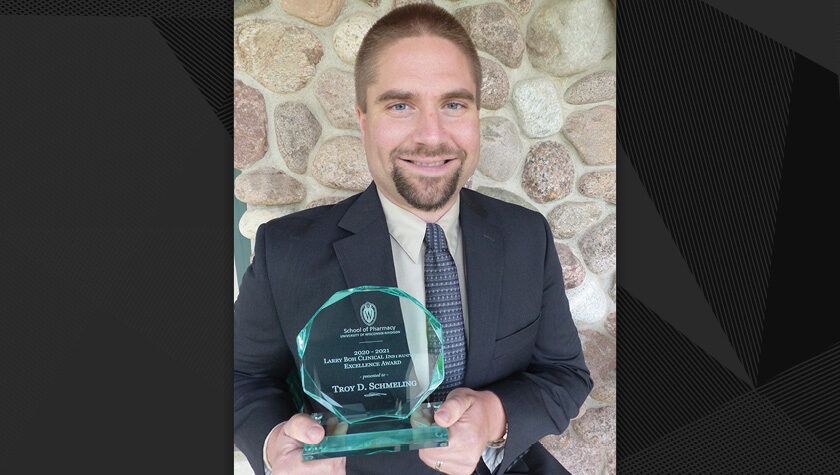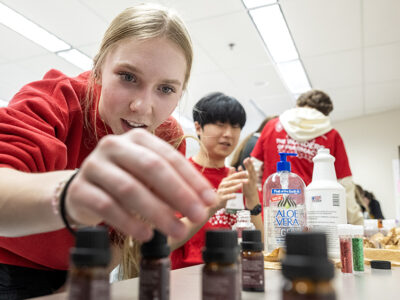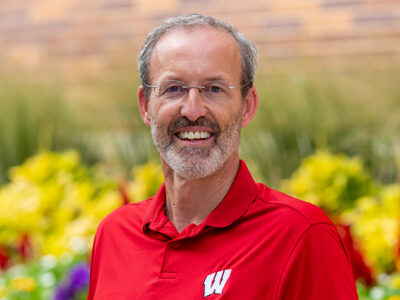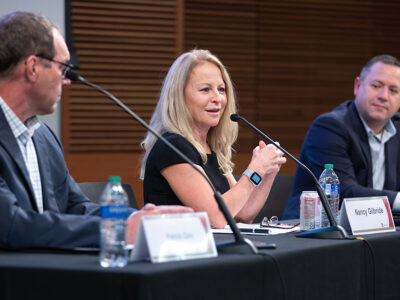
7
June

Troy Schmeling receives the School’s 2021 Larry Boh APPE Clinical Instructor Excellence Award
By Katie Ginder-Vogel
Troy Schmeling (PharmD ’09), pharmacist at Marshfield Medical Center – Beaver Dam, has been a preceptor for student pharmacists for nine years.
“Being involved in student growth and development can be a very rewarding realm of pharmacy practice,” he says.
Schmeling’s role as a hospital pharmacist in a rural area includes a variety of responsibilities, and he says he appreciates having the flexibility to give students a range of exposures. He is also able to tailor the rotation experience to each student’s individual needs.
He prioritizes students’ unique interests, opinions, and questions, and that approach led the University of Wisconsin–Madison School of Pharmacy’s fourth-year PharmD students on their Advanced Pharmacy Practice Experience (APPE) rotations to recognize him with the School’s 2021 Larry Boh APPE Clinical Instructor Excellence Award. Schmeling was honored for the award, named for a former faculty member renowned for his passion for teaching, during the 2021 Graduation Celebration.
“Being involved in student growth and development can be a very rewarding realm of pharmacy practice.”
—Troy Schmeling
“He always encourages students to express their own opinions,” wrote one student. “He allows students to have autonomy while learning.”
The recognition from students was a happy surprise for Schmeling.
“Students have said they were going to nominate me, and I appreciate it, of course, but there are lots of high-quality pharmacists and preceptors out there,” he says. “I feel honored by the award and the School of Pharmacy, and I am very appreciative.”
A multi-faceted experience
At Marshfield Medical Center, Schmeling handles general inpatient pharmacy — processing orders and delivering medications — and he also goes on hospital rounds with nurses and doctors.
“That’s where I like to get students involved, so they get to know other members of the healthcare team, and it seems like they respond well to that and are able to get involved,” says Schmeling.
His rural environment gives student pharmacists a new perspective on their role on the care team, he says.
“It’s a collaborative working environment with other doctors, nurses, and therapists, in a small-town atmosphere,” Schmeling says. “I’m happy to be a part of offering a rural experience to students who are in a Madison hub, where typically they are in urban facilities or larger facilities.”
While Schmeling focuses on inpatient pharmacy, he also helps with order verification and preparation of outpatient oncology medications and antibiotic infusions for the hospital’s outpatient oncology center.
“There is also a nursing home associated with our facility, so I assist with nursing home functions, order processing, and order review,” Schmeling says. “We also have hospice patients we take care of. I enjoy being able to have that variety and work collaboratively in a small, rural setting.”
Schmeling aims to help student pharmacists apply the clinical knowledge they learn at the School of Pharmacy to real-life patient care, such as prioritizing different clinical recommendations, communicating with nurses and doctors, and delivering clinical recommendations in ways that make physicians’ jobs easier.
Schmeling’s professional role includes dedicated project time to collaborate with the antimicrobial stewardship and infectious disease pharmacist at the main Marshfield Clinic campus. He involves students in that collaboration as a way to connect them to the larger parent hospital and help them make professional connections.
“Antimicrobial stewardship and infectious disease pharmacy is a promising field,” he says. “Every hospital needs that role in some way. I appreciate having the support of Marshfield to help students make professional connections while they’re here on rotation.”
Schmeling also connects student pharmacists with other colleagues with unique skill sets in journal clubs or protocol reviews, to share clinical knowledge.
The value of feedback
Schmeling makes a point to meet with students as soon as they begin their rotations to learn about their previous pharmacy experience, their backgrounds, and any barriers or obstacles they’re currently facing or have faced.
“I try to get as much feedback as I can from students throughout their rotations and then do an exit interview, to find out what they liked, didn’t like, and what we could do better,” he says. “I make it a point to try to improve something every year, so that each year, it’s a little better for the next student.”
For example, multiple students gave feedback that commuting from Madison to arrive at Marshfield by 6:30 am was challenging, so Schmeling is in the process of setting up an on-campus housing option for students that’s likely to be available in 2022.
Schmeling says his favorite part of precepting is watching students grow.
“Trying to express a level of encouragement and confidence in their abilities is a way of reciprocating what my professors did for me.”
—Troy Schmeling
“They’re only with us six to 12 weeks, but even in that short period of time, I enjoy seeing the growth that occurs,” he says. “Each student is different and grows in different ways.”
His motivations as a preceptor tie back to when Schmeling was in pharmacy school. Associate Professor Karen Kopacek, now the associate dean for student affairs at the School of Pharmacy, worked with students in the pharmacotherapy lab, and he remembers her support and encouragement when he struggled with subjects or exams and didn’t achieve what he was aiming for.
“She expressed confidence in my abilities and provided encouragement through my pharmacy school experience,” he says. “Reflecting back on my time at the School of Pharmacy has inspired me to incorporate that with our students, as well. Trying to express a level of encouragement and confidence in their abilities is a way of reciprocating what my professors did for me.”







